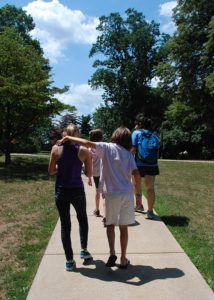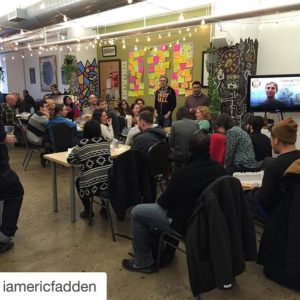Three Community Building Lessons I Learned in Summer Camp

Sam Abrams
 Before I worked at Indy Hall, I was a camp counselor at Camp Sequoia, an overnight camp for kids with social skills difficulties on the autism spectrum and/or with ADHD. For 3 summers I wore many hats; developing the camp’s drama program, taking photos for the website, and chasing after the kids in the 8–12 year old bunk.
Before I worked at Indy Hall, I was a camp counselor at Camp Sequoia, an overnight camp for kids with social skills difficulties on the autism spectrum and/or with ADHD. For 3 summers I wore many hats; developing the camp’s drama program, taking photos for the website, and chasing after the kids in the 8–12 year old bunk.
When I interviewed at Indy Hall, I assumed that being able to work with people in a close capacity, like at camp, would be the most important skill I’d carry over to coworking. Once I got more involved in community building here, however, there were far more similarities than I expected.
Lesson One: Every person is different, and there’s no one-size-fits-all way to interact with them.
I need to make this a mantra for myself- Even after 2+ years working at Indy Hall, I forget this all the time.
I learned very quickly my first summer that no two campers are alike. This may seem obvious, but when you live with your campers, work 6 days a week from 7am-10pm, and have a tight schedule to keep to, this reasonable fact leaves your brain very quickly.
The other reason this tip is so essential is who our campers were- many of the campers are on the spectrum, and there’s a reason it is a spectrum! The cliche about the autism spectrum is that if you meet one person with autism, then you’ve just met one person with autism. (This beautiful graphic by Rebecca Burgess illustrates wonderfully how each individual experiences the world differently).
If there was one technique that got a camper ready for bed, then it would rarely work for another camper- in fact, it’d often backfire completely.
I was grateful that I was never alone wrangling 10–15 kids at bedtime (or any other transition time), but the big difference came from once they had time to settle in and I got to know them better. I learned what they liked and disliked, what topics or activities diverted them when they were upset or homesick, and countless other preferences. It took time, but taking that time was essential to making sure my campers were fed, safe, and happy.
If you took a few minutes to get to know your members, what could you learn?
Now I know, adults in coworking spaces don’t have the same needs as kids at overnight camp- you don’t need to make sure they eat vegetables or remember their goggles before swimming (or if they do, let’s talk because that’s an interesting community!). Your members are more self-sufficient, so it’s easier to fall into autopilot in your interactions with them.
If you’re not sure if you do this, think about how you give a tour to someone who is new to the community. Do you ask about them, or do you give them the same spiel as everyone gets?
How many times have you extended an invitation or told a joke to one member and it worked, but fell flat with another?
It makes sense that this happens- everyone gets busy, and talking about the weather is quick and easy.
However, every time I’ve taken more than a few minutes to get to know someone, we’ve both benefitted.
For me, getting to know people makes it easier to connect them to other members- if I only talked to them about the weather, I would not know that they share an interest with someone or have a skill another member is looking to learn.
More importantly for the members, taking a little extra time tells them I care about them as individuals. Those members pay it forward, and also take extra time to get to know other members. That culture is what makes members stick around, knowing that they have somewhere to go online or in person full of people who care about them.
Lesson Two: Everyone Likes Snacks (and talking to each other).
My first summer at camp was the first summer it ran, so I got to be part of the planning process- and boy, did we plan a lot. Each activity had more than enough lesson plans, contingency plans for rain, activities to do in transition times, and attempts to plan “camp culture” so it felt like a worn-in, tradition-filled camp. With all our preparation, however, everyone’s favorite time of day was the one with the least planning: Snack.
For 15–20 minutes, the campers would have a break from their highly-programmed schedules and get to talk to other campers from different age groups. Even when the other counselors and I would try to organize them, they still end up spreading out to hang out together.
It was the time of day when I watched campers connect, be silly with each other, and (often through that silliness) create traditions that became camp culture (and those camp culture traditions were far better than anything we tried to make happen through planning). Campers taught each other dances (it was prime Harlem Shake time), played games, and generally just ran around.
What do adults do for Snack?
Just like with Snack, I’ve planned a lot of events only to find that our members just want excuses to hang out with each other. When I started I always tried to program for everything, but in every event the best part was when members just chatted with each other.
Now, my rule of thumb is to simply look for those reasons to get people together. It can be professional skill building, like our Lunch and Learn sessions or Meetups, it can be more of a party, like our Scotch Nights and happy hours, and if I’m ever looking for an excuse to get members together, food is always a perfect go-to.

One of our larger New Members Lunches in our old location. I’m in green, making a silly face.
One of our best events is New Members Lunch, which is also the simplest. To start it, a member or I invite members, and then at the lunch have everyone introduce themselves. That’s it! We’re about to re-start potlucks for our members, for no other reason than because sharing a meal is a great way to get people together.
Lesson Three: It’s very rare that someone is actually trying to mess with you.
A big part of my job at camp was diffusing interpersonal conflict. Any group of 8–12 year olds is going to have some conflict, but my campers were also living together in a bunk, with roommates, and some of them were away from home for the first time.
In many cases, my campers also didn’t know how to express what bothers them, see things from another camper’s perspective, or often know how to control their emotions. Usually fights or upsets would come from one camper unconsciously annoying another, concern over whether the outcome of a game or sport is fair, or a camper expecting something that didn’t happen they way they wanted it to.
One summer, I had a room with two boys- one who liked to sing to himself, and one who preferred to yell instead of talk, almost all the time. They’d wake up sleepy and quiet, but once their teeth were brushed it was a cacophony until bedtime. Personally, I loved this little bit of chaos, but you can imagine how tough it was for other campers to live with people creating that much noise. It didn’t help that when a camper got fed up and yelled at their noisy bunkmates, the two would get louder- one to defend himself, the other singing to soothe himself after being yelled at.
When campers came to talk to us about it, almost every time they thought it was personal, and that the pair were loud to annoy them specifically. In truth, both noisy campers were totally unaware of how they affected the other campers. To settle it, we’d calm both sides, and start them talking to one another, and we were able to find ways for everyone to live peacefully. We solved most conflicts at camp by 1) calming everyone down, and 2) pointing out context or other points of view. The louder campers would still be loud, but now other campers could address it, and we planned for loud and quiet times.
These conflicts were not limited to campers, either. In my third summer I was a Division Leader for the 8–12 year old group, and dealt with similar conflicts from counselors.
One counselor (who also was the photographer that year) was never around for bedtime, a particularly tough time since the most campers would get homesick at night. As the division leader, I couldn’t understand why he was slacking off at the one time we needed him most, so I sat down with him and learned a few things: 1- that he was annoyed at me constantly telling him he needed to be there, and 2- that he had been told he had to be in the office at that time, uploading photos, and that expectation was set when he was hired.
Suddenly all the fury I had about being left high and dry was gone- he was just doing what he was supposed to do.
But I thought everyone gets along in coworking spaces!
In coworking, you’re in a similar situation- sharing space and resources, spending a lot of time together, and working with a particular set of expectations. Just like camp, that closeness makes working here amazing, but also leads to misunderstanding and conflict. Additionally, members come to coworking spaces to work, and sometimes that narrow focus excludes their environment or neighbors.
I’m sure everyone has experienced that desk-neighbor who shakes their leg constantly, leaves everything messy, or talks on the phone loudly. In all of these cases, it’s just like the two loud campers- they probably don’t notice that it affects their neighbors at all. A simple conversation makes a huge difference, and will diffuse any fury about these annoying behaviors.
I’ve also experienced it with my members. There are times when I’ve come in on a Monday to find dirty dishes left in the sink from the weekend (or maybe earlier, ick). It always feels personal at first, because hey, this is my space too! After cooling down, each time I realize it has nothing to do with me. Usually it happens when the dishwasher was full and members were hurrying to leave for the weekend.
Then comes the fun part (for me): once I realize members don’t notice how leaving dishes affects others, I can think up ways to remind them (that aren’t annoying signs or nagging). Rather than a chance to get angry or guilt anyone, it’s an opportunity to be creative.
Sometimes, of course, disputes are larger than dishes in the sink. When that’s the case, I use the first two tips I learned from camp: one, treat everyone as an individual, then two, give them a snack.
Unlike camp, our members are adults, which means (most of the time) they have an easier time talking to one another about what’s upsetting them. Often I know a member well enough to stay out of it, knowing they can handle talking to the person bothering them, and won’t bottle it up. Sometimes, depending on the member, I’ll offer help in the form of cooling down- we’ll go grab a tea or a snack, or I’ll provide a sounding board to vent to. It still points to a conversation, but this way I can provide assistance to people I care about without getting in the middle.
The secret to implementing all of these tricks is to slow down.
Try to make sure to get to know people individually. Try to find opportunities for members to connect. Try to slow down to get perspective in a conflict. It won’t be easy, it will take time and practice.
When you find yourself on autopilot, overcomplicating events, or in reaction mode, just look at one thing at a time. Slow down. Take a breath. When you take your time, it allows you to be thoughtful in your planning and with everyone you interact with. Trust me, your members will notice the difference.
Don't miss our next post
Stories, insights, and community updates delivered to your inbox weekly.
